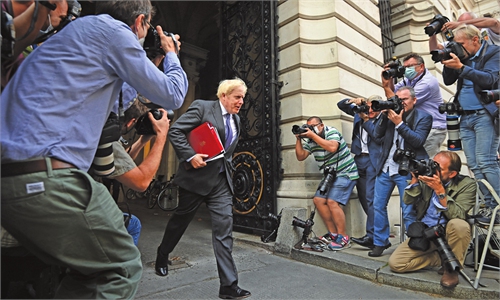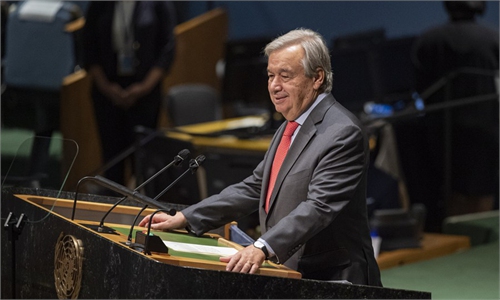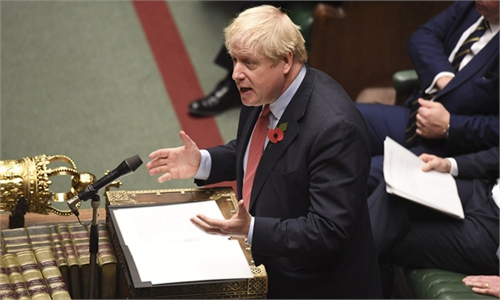
Illustration: Liu Rui/GT
The Boris Johnson government unveiled its post-Brexit policy roadmap called, "Global Britain in a Competitive Age." What is controversial to many is that the UK will increase its arsenal of nuclear warheads. Nonetheless, the move is unlikely an "ultimate insurance policy" as UK Foreign Secretary Dominic Raab claimed. But it has the potential to trigger a new arms race.
UK's decision to increase the number of nuclear warheads could be a result of its consultation with the US. The UK now does not have independent research and manufacturing systems for nuclear weapons. The ballistic missiles equipped on UK's strategic nuclear submarines are actually US-produced Trident missiles. The nuclear warheads are also provided by the US. Therefore, the US and the UK may simultaneously upgrade their nuclear warheads and even research and develop the next generation of submarine-launched ballistic missiles together.
The UK hopes to raise its discourse power among European countries with the development of nuclear weapons. It also hopes to influence relations between Europe and Russia with its adjustment of nuclear policies. At present, NATO and Russia are engaged in an intense military competition. It is very likely that the US wants to adjust its policy regarding nuclear weapons. The UK has played a coordinating role in this, and the two are watching Russia's response closely.
If Russia responds with a tit-for-tat approach, then relations between Europe and Russia would become worse. From this perspective, UK's plan to increase its arsenal of nuclear warheads can be seen as a test. It may generate more distrust, misunderstandings, or even doubt between Europe and Russia on issues such as arms control and nuclear weapons. It is clear that the UK is aimed at a new cold war.
While Raab confirmed that the UK is expanding its nuclear arsenal, he also said the threat of nuclear from Iran, "keeps him awake." In fact, Iran is only an excuse. Many European countries hope to improve ties with Russia, especially Germany and France. So the UK chose an easy target, which could be accepted by European countries.
But Iran doesn't really have any nuclear weapons, and there is no way that it can target European countries with a nuclear deterrent strike. So what the West said about Iran is only because of the cold war mind-set.
This report identifies a realistic possibility of a terrorist group launching a chemical, biological, radiological or nuclear attack in 2030. But it gives no further details to support this assertion. This is a typical conspiracy theory designed to create a false enemy.
It is true that there is a risk of global proliferation or leakage of weapons of mass destruction. However, this risk is now relatively manageable.
Although Europe also faces threats by extremist or terrorist groups, but most of these are lone wolf terrorists, or a small number of organized terrorists. They mainly use rifles, explosives and knives to carry out some attacks. As of now, the extremist forces in Europe or those who are able to infiltrate Europe do not have the ability to use nuclear, chemical and biological weapons. Now the UK is somehow worried. It is trying to play up a more exaggerated terrorist threat theory to terrify the whole of Europe. This is only an excuse for UK's own expansion of nuclear weapons.
Currently, UK's overall strength is actually declining. Compared with France and Germany, UK's voice is also weakening on the global level. If its economy gets more and more sluggish, and its overall diplomatic influence weakens, the UK may only have military power left as a last resort to showcase its strength.
The UK is now proactively seeking its new role on global arena after Brexit. Thus, it is putting more emphasis on increasing its influence in the Indo-Pacific region. However, UK's current strength is not strong enough to cooperate with US Indo-Pacific Strategy. It has no global base network like the US, and is unlikely to realize normalized military presence in the region.
Therefore, the UK is more likely to boost its nuclear strike capability in an attempt to show off its traditional advantage and in turn raised its status and influence. That's all. UK's national strength is declining on the whole, that's why it knows well it needs to rely on cooperation with the US and is purchasing missiles and nuclear warheads from the US. In this way, London can both save money and obtain high technology from Washington.
The UK's move to raise its nuclear weapons will violate the Treaty on the Non-Proliferation of Nuclear Weapons. Such a policy change must be instigated or approved by the US as strategic cooperative tactic between the two.
The author is a Beijing-based military analyst. opinion@globaltimes.com.cn



